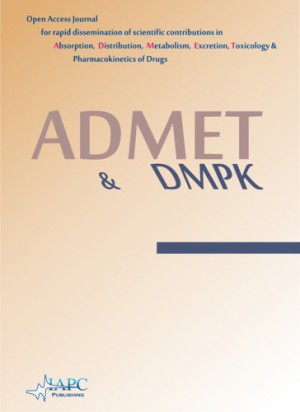
ADMET & DMPK
Yazarlar: Rhiannon N. Hardwick, Marina Snellings, Brian C. Ferslew, Yang Lu, Kim L.R. Brouwer
Konular:-
DOI:10.5599/admet.4.4.322
Anahtar Kelimeler:ABC transporters,Transport inhibition
Özet: Tyrosine and aurora kinases are important effectors in signal transduction pathways that are often involved in aberrant cancer cell growth. Tyrosine (TKI) and aurora (AKI) kinase inhibitors are anti-cancer agents specifically designed to target such signaling pathways through TKI/AKI binding to the ATP-binding pocket of kinases thereby leading to diminished kinase activity. Some TKIs have been identified as inhibitors of ATP-binding cassette (ABC) transporters such as P-glycoprotein and breast cancer resistance protein (BCRP), which are commonly upregulated in malignant cells. TKI/AKIs have been investigated as ABC transporter inhibitors in order to facilitate the accumulation of concomitantly administered chemo-therapeutics within cancer cells. However, ABC transporters are prominently expressed in the liver and other eliminating organs, and their inhibition has been linked to intracellular accumulation of drugs, altered disposition, and toxicity. The potential for TKIs/AKIs to inhibit other important hepatic efflux transporters, particularly multidrug resistance-associated proteins (MRPs), remains unknown. The aim of the current study was to compare the inhibitory potency of 20 selected TKI/AKIs against MRP4 and BCRP through the use of inverted membrane vesicle assays. Relative IC50 values were estimated by determining TKI/AKI inhibition of MRP4-mediated [3H]-dehydroepiandrosterone sulfate uptake and BCRP-mediated [3H]-estrone sulfate uptake. To provide insight to the clinical relevance of TKI/AKI inhibition of ABC efflux transporters, the ratio of the steady-state maximum total plasma concentration (Css) to the IC50 for each compound was calculated with Css/IC50 ratio >0.1 deemed potentially clinically relevant. Such analysis identified several potentially clinically relevant inhibitors of MRP4: alisertib, danusertib, erlotinib, lapatinib, neratinib, nilotinib, pazopanib, sorafenib, and tozasertib. The potentially clinically relevant inhibition of BCRP was much more extensive and included alisertib, barasertib, danusertib, enzastaurin, erlotinib, gefitinib, imatinib, neratinib, nilotinib, pazopanib, selumetinib, sorafenib, sunitinib, tozasertib, and vandetanib. These findings indicate the significant potential for TKI/AKIs to inhibit multiple ABC efflux transporters. The resulting inhibition data could provide insight regarding the clinical interpretation of pharmacokinetic/pharmacodynamic outcomes when TKI/AKIs are administered concomitantly with additional chemotherapeutic agents.